Let’s be honest—managing diabetes can feel like a constant balancing act with blood sugar. But one thing that’s really helped me (and countless others) is finding the right recipes that work for diabetes. When meals are crafted to be blood-sugar-friendly, they’re not just helping to keep glucose steady—they’re making you feel healthier overall, which is something I appreciate every day.
These recipes aren’t about restriction; they’re about choosing ingredients that support your body’s needs. Most of them are lower in carbs but packed with fiber, nutrients, and healthy fats that help keep you satisfied without causing a blood sugar spike. It feels empowering to make food choices that make a real difference, letting you take control of your health, meal by meal.
What Makes a Recipe Diabetes-Friendly?
I’ve found that truly diabetes-friendly recipes don’t leave you guessing about blood sugar. They’re based on foods with a low glycemic index—so you’re not left dealing with sudden spikes. Here are some things I always look for in these recipes to know they’ll support my blood sugar:
- Low-Carb Focus: Reducing carbs has been essential for managing my blood sugar. It’s amazing how much easier it feels to stay in control when carbs are limited.
- High in Fiber: Fiber has been a lifesaver, not just for blood sugar stability but for keeping everything running smoothly with digestion. I feel fuller and don’t get those sugar highs and lows.
- Healthy Fats: I used to shy away from fats, but adding healthy ones—like avocado and nuts—has helped me stay satisfied and balanced. They’re great for steady energy without impacting blood sugar too much.
- Protein-Rich Ingredients: Including lean proteins, like chicken or fish, has been key. They keep me feeling full and give me the energy I need throughout the day.
Natural Sweeteners Only: I’ve swapped out sugar for natural sweeteners like stevia or monk fruit, and it’s been a game-changer. They add sweetness without the blood sugar roller coaster, letting me enjoy treats without worry.
10 Diabetes Recipes
1. Low-Carb Avocado Chicken Salad
This refreshing salad is rich in healthy fats, fiber, and lean protein, making it a perfect choice for those managing their diabetes.
Ingredients:
- 2 chicken breasts, cooked and shredded
- 1 ripe avocado, diced
- 1 cup mixed greens
- ½ cucumber, sliced
- ½ red onion, thinly sliced
- 2 tablespoons olive oil
- Juice of 1 lemon
- Salt and pepper to taste
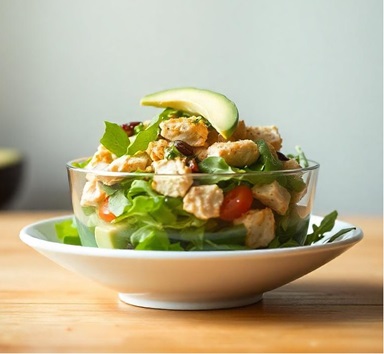
Steps:
- Cook the chicken breasts and shred them once cooled.
- In a large bowl, combine the chicken, diced avocado, mixed greens, cucumber, and red onion.
- In a small bowl, whisk together the olive oil, lemon juice, salt, and pepper.
- Drizzle the dressing over the salad and toss to combine.
- Serve immediately or refrigerate for a refreshing lunch option.
Benefits: This salad is packed with heart-healthy fats from the avocado and olive oil, which support balanced nutrition and help manage blood sugar levels. The protein from chicken helps maintain muscle and keeps you feeling full longer.
2. Zucchini Noodles with Lean Turkey Meatballs
Zucchini noodles replace traditional pasta in this flavorful dish, making it a perfect low-carb meal option.
Ingredients:
- 2 zucchinis, spiralized into noodles
- 1 lb lean ground turkey
- 1 egg
- ¼ cup almond flour
- 1 teaspoon garlic powder
- 1 teaspoon dried oregano
- 1 cup sugar-free marinara sauce
- Salt and pepper to taste
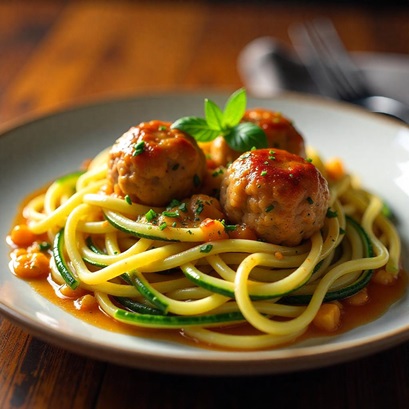
Steps:
- Preheat the oven to 375°F (190°C).
- In a bowl, combine the ground turkey, egg, almond flour, garlic powder, oregano, salt, and pepper.
- Roll the turkey mixture into small meatballs and place them on a baking sheet.
- Bake for 20 minutes or until cooked through.
- While the meatballs are baking, sauté the zucchini noodles in a pan for 2-3 minutes.
- Serve the meatballs on top of the zucchini noodles and cover with marinara sauce.
Benefits: This recipe is a great source of protein from turkey, and the zucchini noodles offer a low-carb alternative to traditional pasta. It’s perfect for sugar management and helps reduce the glycemic impact of the meal.
3. Grilled Salmon with Spinach & Asparagus
Salmon is rich in omega-3 fatty acids, making it a fantastic choice for diabetes management.
Ingredients:
- 2 salmon fillets
- 1 tablespoon olive oil
- 1 teaspoon lemon zest
- 1 bunch asparagus, trimmed
- 2 cups spinach
- Salt and pepper to taste

Steps:
- Preheat the grill to medium heat.
- Brush the salmon fillets with olive oil and season with lemon zest, salt, and pepper.
- Grill the salmon for 4-5 minutes per side or until cooked through.
- In a pan, sauté the asparagus and spinach in olive oil for 3-4 minutes until tender.
- Serve the grilled salmon over the sautéed veggies.
Benefits: Salmon provides healthy fats that support balanced nutrition, while spinach and asparagus add fiber, which is essential for blood sugar control. This dish is low in carbs and high in protein, making it great for diabetes management.
4. Cauliflower Rice Stir-Fry with Veggies
Cauliflower rice is a great low-carb substitute for regular rice, making this stir-fry an excellent diabetes-friendly meal.
Ingredients:
- 1 head cauliflower, grated into rice-sized pieces
- 1 tablespoon olive oil
- 1 cup mixed vegetables (bell peppers, carrots, peas)
- 2 cloves garlic, minced
- 2 eggs, beaten
- 2 tablespoons soy sauce (or coconut aminos)
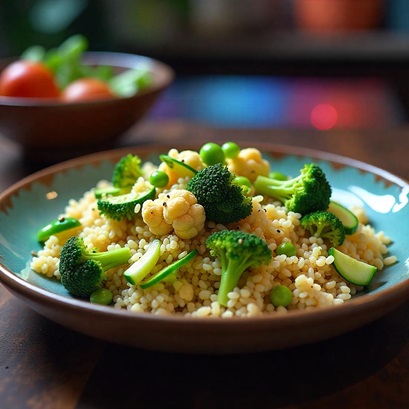
Steps:
- Heat olive oil in a large pan over medium heat.
- Add garlic and sauté for 1 minute.
- Add the mixed vegetables and cook for 5 minutes.
- Push the veggies to one side of the pan and scramble the beaten eggs in the other side.
- Add the cauliflower rice to the pan, and cook for 5-7 minutes, stirring occasionally.
- Drizzle with soy sauce and serve.
Benefits: This stir-fry is low in carbs, which helps to control glycemic impact. The vegetables provide fiber, and the eggs offer protein, making it a well-rounded dish for blood sugar control.
5. Baked Chicken with Roasted Brussels Sprouts
Roasted Brussels sprouts and baked chicken are a delicious combination of lean protein and fiber-rich veggies.
Ingredients:
- 2 chicken breasts
- 1 tablespoon olive oil
- 1 teaspoon paprika
- 1 teaspoon garlic powder
- 2 cups Brussels sprouts, halved
- Salt and pepper to taste
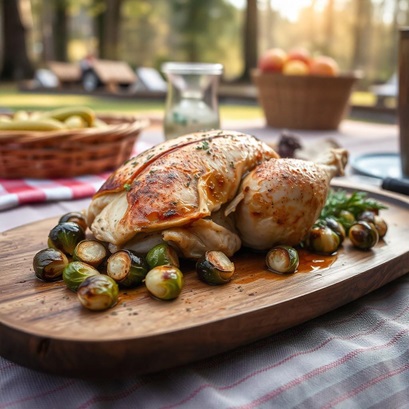
Steps:
- Preheat the oven to 400°F (200°C).
- Rub the chicken breasts with olive oil, paprika, garlic powder, salt, and pepper.
- Place the chicken breasts on a baking sheet and surround them with halved Brussels sprouts.
- Roast for 25-30 minutes, or until the chicken is fully cooked.
Benefits: Chicken is a lean protein that helps support balanced nutrition, and Brussels sprouts are high in fiber, which can help stabilize blood sugar levels. This meal is a great option for maintaining blood sugar control.
6. Lentil and Quinoa Veggie Bowl
This hearty, plant-based meal is rich in fiber and protein, providing great diabetes-friendly benefits.
Ingredients:
- 1 cup cooked lentils
- 1 cup cooked quinoa
- 1 cup mixed veggies (e.g., bell peppers, spinach, tomatoes)
- 1 tablespoon olive oil
- Lemon juice to taste
- Salt and pepper to taste
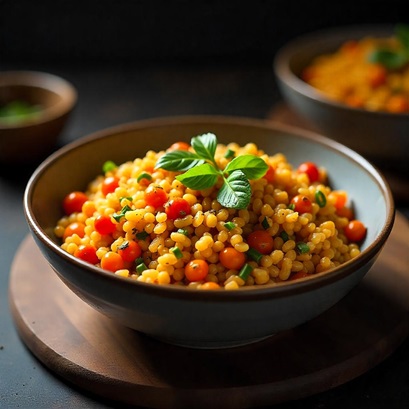
Steps:
- Cook lentils and quinoa according to package instructions.
- Sauté the mixed veggies in olive oil for 5-7 minutes.
- Combine the cooked lentils, quinoa, and sautéed veggies in a bowl.
- Drizzle with lemon juice and season with salt and pepper.
Benefits: Lentils and quinoa are both high in fiber and protein, helping to regulate blood sugar and support sugar management. This meal provides a balanced mix of nutrients, perfect for a healthy lifestyle.
7. Kale and Sweet Potato Salad
This salad is packed with nutrients that help regulate blood sugar, making it ideal for those with diabetes.
Ingredients:
- 2 cups kale, chopped
- 1 medium sweet potato, roasted and diced
- ¼ cup walnuts
- 2 tablespoons olive oil
- Salt and pepper to taste
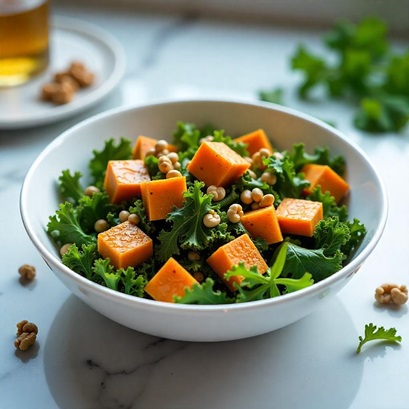
Steps:
- Roast the sweet potato at 375°F (190°C) for 25-30 minutes until tender.
- Toss the kale with olive oil, salt, and pepper.
- Add the roasted sweet potato and walnuts.
- Serve immediately.
Benefits: Sweet potatoes are high in fiber and have a lower glycemic index, which helps with blood sugar control. Kale is nutrient-dense and supports a healthy lifestyle, making this salad a great diabetes-friendly option.
8. Cucumber and Tomato Salad with Olive Oil Dressing
A simple, refreshing salad with plenty of hydration and healthy fats that helps to manage blood sugar levels effectively.
Ingredients:
- 1 cucumber, sliced
- 2 medium tomatoes, diced
- ½ red onion, thinly sliced
- 1 tablespoon extra virgin olive oil
- 1 tablespoon apple cider vinegar
- 1 teaspoon dried oregano
- Salt and pepper to taste
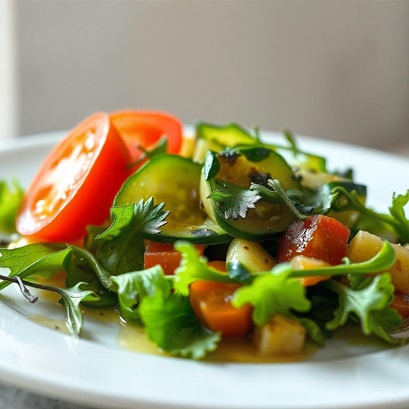
Steps:
- In a large bowl, combine the cucumber, tomatoes, and red onion.
- In a small bowl, whisk together the olive oil, apple cider vinegar, oregano, salt, and pepper.
- Drizzle the dressing over the salad and toss gently to coat.
- Serve immediately or refrigerate for a cool, refreshing side dish.
Benefits: This salad is low in carbs and high in hydration, making it great for blood sugar control. The olive oil adds heart-healthy fats, and the fresh vegetables are high in fiber, promoting balanced nutrition and aiding in sugar management.
9. Spaghetti Squash Primavera
Spaghetti squash is a wonderful low-carb alternative to traditional pasta, and paired with fresh vegetables, it makes a flavorful and filling meal.
Ingredients:
- 1 medium spaghetti squash
- 1 tablespoon olive oil
- 1 bell pepper, sliced
- 1 zucchini, sliced
- 1 cup cherry tomatoes, halved
- 2 cloves garlic, minced
- 1 tablespoon fresh basil, chopped
- Salt and pepper to taste
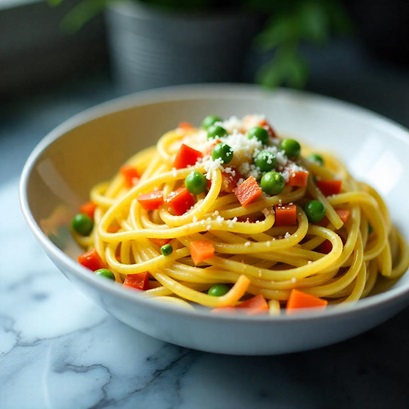
Steps:
- Preheat the oven to 375°F (190°C).
- Cut the spaghetti squash in half lengthwise and remove the seeds.
- Drizzle olive oil over the cut sides and season with salt and pepper.
- Roast the squash halves for 40-45 minutes until tender.
- While the squash is roasting, heat olive oil in a pan over medium heat and sauté the bell pepper, zucchini, tomatoes, and garlic for about 5-7 minutes until softened.
- Once the squash is done, use a fork to scrape the flesh into spaghetti-like strands.
- Toss the roasted squash with the sautéed veggies and fresh basil.
Benefits: Spaghetti squash provides a low-carb, fiber-rich base, which helps regulate blood sugar levels. The vegetables add nutrients and antioxidants, making this dish excellent for glycemic impact reduction and promoting a healthy lifestyle.
10. Eggplant Lasagna with Ricotta and Spinach
This diabetes-friendly lasagna swaps traditional pasta for eggplant, reducing carbs while still providing all the flavors you love.
Ingredients:
- 2 medium eggplants, sliced into thin rounds
- 1 cup ricotta cheese
- 2 cups fresh spinach, chopped
- 1 cup marinara sauce (sugar-free)
- 1 cup shredded mozzarella cheese
- 1 tablespoon olive oil
- Salt and pepper to taste
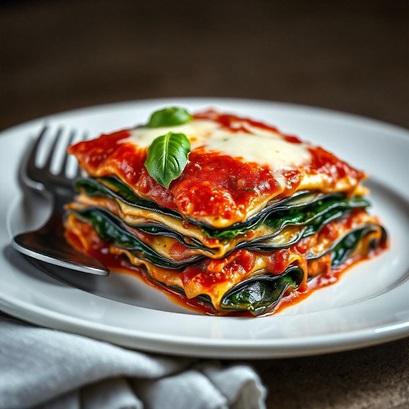
Steps:
- Preheat the oven to 375°F (190°C).
- Lightly brush the eggplant slices with olive oil and season with salt and pepper.
- Roast the eggplant slices for 20-25 minutes until tender.
- In a bowl, combine the ricotta cheese, spinach, salt, and pepper.
- In a baking dish, layer the roasted eggplant slices with the ricotta-spinach mixture, marinara sauce, and mozzarella cheese.
- Repeat the layers, finishing with a layer of mozzarella on top.
- Bake for 30 minutes until bubbly and golden.
Benefits: Eggplant is low in carbs and packed with fiber, making it an ideal choice for blood sugar control. This lasagna also provides a good amount of protein and calcium from the ricotta and mozzarella cheeses, helping to support balanced nutrition.
What Should You Avoid?
While managing diabetes, it’s essential to avoid certain foods that can cause spikes in blood sugar and disrupt sugar management. Here’s a list of foods to minimize or avoid completely:
- Refined Carbohydrates: Foods like white bread, pastries, and crackers made with refined flour can cause rapid blood sugar increases.
- Sugary Snacks and Beverages: Sugary sodas, candies, cakes, and ice cream can significantly raise blood sugar levels.
- Fried Foods: Foods like fried chicken, fries, and other greasy options are not only high in unhealthy fats but also cause inflammation, which can worsen insulin resistance.
- Processed Meats: Bacon, sausages, and deli meats often contain added sugars and preservatives, which are not ideal for blood sugar control.
- High-Sodium Foods: Foods high in sodium, such as canned soups, processed snacks, and salty packaged foods, can raise blood pressure and negatively impact overall health.
By avoiding these foods and focusing on diabetes-friendly meals, you can better manage your condition and enjoy a healthy lifestyle.
Conclusion
Incorporating diabetes recipes into your daily meals is a great way to keep your blood sugar in check. By choosing low-carb dishes packed with fiber, healthy fats, and lean proteins, you can manage your condition without sacrificing flavor. The recipes we’ve shared offer balanced nutrition, helping you maintain control over your blood sugar while supporting your overall health.
And don’t worry—diabetes-friendly meals don’t have to be bland! There are plenty of delicious and satisfying options that will leave you feeling full and happy. The key is to focus on whole, nutrient-rich foods and avoid processed ingredients, which helps keep you on track for better health. By making thoughtful food choices, you can take charge of your diabetes and live a vibrant, energized life.


